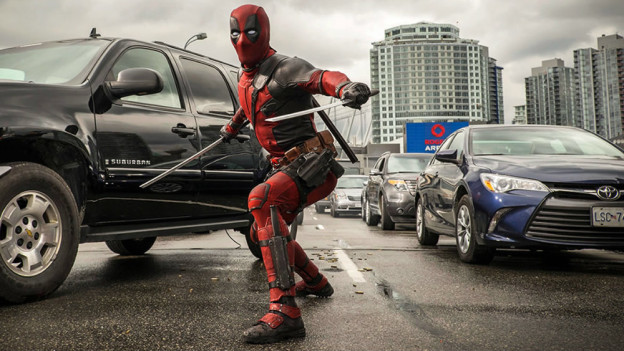Deadpool is a film that, by all rights, shouldn’t even exist. The Marvel anti-hero — known for his foul mouth and cavalier approach to violence — made his big-screen debut (sort of) in 2009 film X-Men Origins: Wolverine, a release that is universally considered the low point for Fox’s mutant franchise. In particular, its bastardization of fan-favorite Deadpool earned the wrath of fans everywhere. Yet, actor Ryan Reynolds remained attached to a solo film centering on a proper interpretation of the character’s backstory, and seven years later, we’re finally getting to see what The Merc with the Mouth was intended to be all along.
Tim Miller — head of visual effects company Blur Studio — makes his directorial debut with the offbeat story of how mercenary Wade Wilson (Reynolds) winds up with regenerative powers. Right from its opening credits sequence, Deadpool brilliantly sets its distinctive tone, one that aims to both satirize the current superhero boom as well as its own production. In the comics, Deadpool frequently breaks the fourth wall and acknowledges the absurdity of the events he encounters, and his film conveys a similar rebellious attitude towards the conventional “rules” of filmmaking.
In the hands of Zombieland screenwriters Paul Wernick and Rhett Reese, the film balances a razor-sharp (and very R-rated) wit against a sweet love story, finding the emotional connection that keeps Deadpool from feeling silly and inconsequential. Instead, the film’s revenge story and frenetic action remain grounded until the very end (and yes, you want to stay until after the credits for a clever bonus scene).
Even so, there are certainly points at which the film — especially during frequent flashbacks to Wade’s pre-Deadpool days — bears a bit too much resemblance to the clichéd superhero origin story. On some level, that’s the purpose of Deadpool, to provide its own irreverent spin on those storytelling tropes, but it still detracts from the strength of the film as a whole. There’s only so much slack one can cut a project that relies on pre-existing narrative conventions, no matter how fresh its execution is. Moreover, a few of the self-referential jokes come across as a bit lazy and/or repetitive (we get it, you guys really wanted Hugh Jackman in this).
That said, Deadpool largely rises above these concerns, thanks to Wernick and Reese’s script and the pitch-perfect casting of Reynolds. The actor was born to play this role, and his sarcastic sense of humor fits Deadpool as snugly as his red spandex suit. Ed Skrein and Gina Carano don’t fare nearly as well in the stock “British villain” and henchwoman roles, but Firefly veteran Morena Baccarin and comedian T.J. Miller contribute greatly to the film’s heart and comedy, respectively, as Wade’s love interest and closest ally.
In many respects, Deadpool represents a pivotal step for superhero cinema. Each passing year seems to bring more and more CGI-heavy comic book adaptations to the screen, and though Miller’s film features its fair share of computer-generated effects (including an entirely CGI supporting character in X-Man Colossus), it’s honestly a more intimate take on the genre. Most impressively, the film’s reverent take on the source material and its fearlessness to inject Fox’s established X-Men franchise with explicit language and extreme violence is bound to herald a new era of superhero cinema. Here’s hoping that, whatever films the future brings, Reynolds’ Deadpool remains a part of the big picture for a long time coming.
Rating: 4 out of 5
Deadpool stars Ryan Reynolds, Morena Baccarin, T.J. Miller, Ed Skrein, Gina Carano, Brianna Hildebrand, Leslie Uggams and the voice of Stefan Kapicic. It is directed by Tim Miller and written by Paul Wernick and Rhett Reese.Follow Robert Yaniz Jr. on Twitter @CrookedTable! Click here for more Crooked Table reviews!


